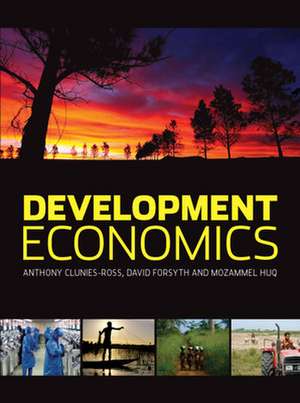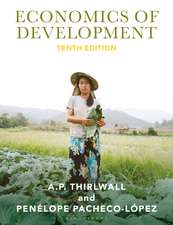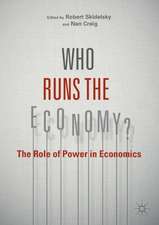Development Economics
Autor David Forsyth, Mozammel Huq, Anthony Clunies-Rossen Limba Engleză Paperback – 16 apr 2009
This textbook presents a concise and up-to-date examination of the field of development economics, bringing together historical perspectives, current issues and policy implications. Each chapter can be read as a stand-alone unit, or as part of the wider economic debates presented throughout the book.
Preț: 557.28 lei
Preț vechi: 687.99 lei
-19% Nou
Puncte Express: 836
Preț estimativ în valută:
106.63€ • 111.63$ • 88.23£
106.63€ • 111.63$ • 88.23£
Carte tipărită la comandă
Livrare economică 05-19 aprilie
Preluare comenzi: 021 569.72.76
Specificații
ISBN-13: 9780077114534
ISBN-10: 0077114531
Pagini: 664
Dimensiuni: 198 x 264 x 46 mm
Greutate: 1.56 kg
Editura: McGraw Hill Education
Colecția McGraw Hill / Europe, Middle East & Africa
Locul publicării:United Kingdom
ISBN-10: 0077114531
Pagini: 664
Dimensiuni: 198 x 264 x 46 mm
Greutate: 1.56 kg
Editura: McGraw Hill Education
Colecția McGraw Hill / Europe, Middle East & Africa
Locul publicării:United Kingdom
Cuprins
PART 1 History, ideologies and methods
1. Recognizing the development imperative
2. Economic development: the story over fifty years
3. Ideologies and methods of development economics
4. Macroeconomic theories of economic growth
5. The development process: landmark theories PART 2 Governance
6. Governance questions 1: corruption
7. Governance questions 2: public-sector scope, enhancement and reform
8. Civil society: role and potential
PART 3 Central global questions
9. Globalization: trade, trade policy, international economic relations
10. Poverty, equity and well-being
11. Sustainable development, environmental evaluation, natural resources
12. Stabilization in developing countries
PART 4 Real resources and sectoral considerations
13.Population and labour supply
14. Migration and urbanization
15. Gender and development
16. Agricultural development, food supply and rural transformation
17. Industrialization and development
18. Building technological capability
PART 5 Finance
19. Domestic finance
20. Elaboration of economic project-appraisal
21. Foreign aid
22. Loans and debt
23. Foreign direct investment
24. International migration and remittances
PART 6 Conclusion
25. Guidelines, judgements and possibilities
1. Recognizing the development imperative
2. Economic development: the story over fifty years
3. Ideologies and methods of development economics
4. Macroeconomic theories of economic growth
5. The development process: landmark theories PART 2 Governance
6. Governance questions 1: corruption
7. Governance questions 2: public-sector scope, enhancement and reform
8. Civil society: role and potential
PART 3 Central global questions
9. Globalization: trade, trade policy, international economic relations
10. Poverty, equity and well-being
11. Sustainable development, environmental evaluation, natural resources
12. Stabilization in developing countries
PART 4 Real resources and sectoral considerations
13.Population and labour supply
14. Migration and urbanization
15. Gender and development
16. Agricultural development, food supply and rural transformation
17. Industrialization and development
18. Building technological capability
PART 5 Finance
19. Domestic finance
20. Elaboration of economic project-appraisal
21. Foreign aid
22. Loans and debt
23. Foreign direct investment
24. International migration and remittances
PART 6 Conclusion
25. Guidelines, judgements and possibilities














